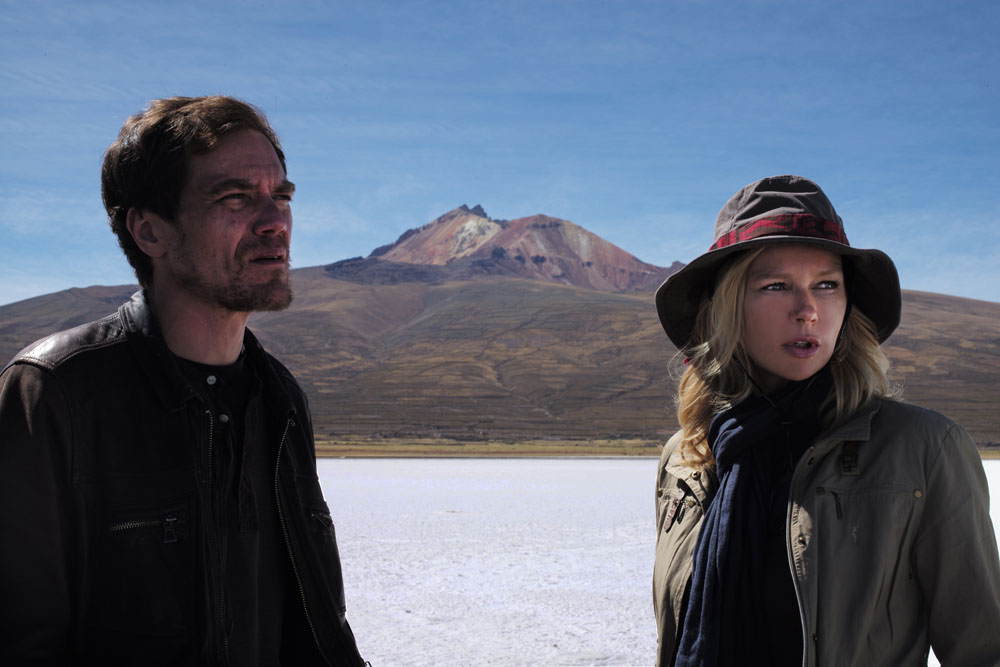But Danny Kasman is “not actually sure this film isn’t entirely a comedy through and through. With its arch-stilted dialog, forever delaying the actual plot as kidnap mastermind Michael Shannon unhurriedly tours bioscientist Veronica Ferres around his compound in Unnamed Latin American Country, conversing on the perspectives of reality, and containing plenteous jokes about the supposed wheelchair-bound ‘brain’ behind the plot (played to perfection by theoretical physicist Lawrence Krauss), Salt and Fire seems intentionally torpid and generally vague about what’s at stake in the supposed earthly catastrophe that Shannon oversaw and Ferres is coming to study.” What if Salt and Fire is “a fiction so absurd that when looked at askew it is in fact a disturbing documentary?”
“Some of the dialogue suggests that Herzog himself has grown accustomed to being a meme,” proposes Jake Cole at the House Next Door, “as when two of the captured scientists eat bad food and develop diarrhea. Or, as Gael García Bernal‘s Dr. Fabio Cavani puts it: ‘There are hordes of protozoans swirling in my digestive tract!'” He agrees, though, that, over time, “the film settles into the strange pulses of mystery that characterizes the director’s early, engrossing fiction. No one else has the same ability to make the alienating so thoroughly hypnotic, and gradually, Herzog manages to tie even the most distracted asides into the whole.”
“The acting in this film is bad,” writes Noel Murray at the Playlist, “and the writing’s ridiculous; and yet these aren’t bad actors, and Herzog (adapting a Tom Bissel short story) isn’t typically a clumsy writer. So what gives?… Maybe he’s just at a phase in his career where he prefers dissonance. That’s certainly Herzog’s right as an artist responsible for so many masterworks. Whatever the rationale for this film’s clunkiness might be doesn’t completely ruin what turns out to be a surprising and occasionally beautiful film.”

For the Guardian‘s Nigel M. Smith, it all boils down to “how foreign surroundings can change a person. It’s a topic that has fascinated the filmmaker for much of his storied career, most searingly in his 2005 documentary Grizzly Man. Salt and Fire has more in common with Queen of the Desert, boasting an equally risible screenplay and messy performances—but like all of Herzog’s output, it casts its own strange spell.”
“Salt and Fire’s strange rhythms are so in-tune with Shannon’s own performance and inherent presence that he, the heir apparent to the Christopher Walken throne in terms of The Great American Weird Actor, seems to emerge as something of a co-author,” finds Ethan Vestby at the Film Stage.
“Characters waffle about aliens and conspiracies, science fiction and time travel,” grumbles Screen‘s Wendy Ide. “But nobody seems to have anything insightful to say.”
“XLrator Media has picked up the US rights,” and Etan Vlessing has the story in the Hollywood Reporter.
Update, 9/18: Salt and Fire “is a slow-motion car wreck of an enterprise, nothing more than an exercise in wasting people’s money and precious time,” argues Robert Koehler, writing for CinemaScope. “The first half may aim to be a two-hander in the realm of one of David Hare’s political dramas, and the second half a cockeyed Crusoe adventure, but neither section coheres or for a single moment sounds credible. Worst of all, Ferres, who obviously can’t act in English, is in every scene. Shannon, who has managed well with Herzog before in My Son, My Son, What Have Ye Done? (2009), appears this time more lost than the German soldier at the end of Herzog’s Lebenszeichen (1968). It ain’t a pretty sight.”
Update, 9/23: “Roger Ebert once said of Werner Herzog that, ‘even his failures are spectacular,'” notes Kurt Halfyard at Screen Anarchy. “I’m curious if he were alive today, what he would have made of Salt and Fire, a rushed, sloppy and rather turgid film that has been (charitably) billed as a ‘thriller.'”
The 2016 fall film festival indexes: Venice, Telluride, and Toronto.




